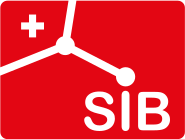Programme
Section outline
-
Approximate timing for a typical day is the following:
09:00 - 12:30 lectures
12:30 - 14:00 lunch
14:00 - 17:00/30 practical / exercises
17:00/30 - 19:00/30 free
19:00/30 dinnerSunday 19 November - Broad introduction and welcome dinner
Dr Frédéric Schütz, SIB Swiss Institute of Bioinformatics
17:00 - 18:00 Arrival of the participants
18:15 Informal welcome and presentation of the event (Grégoire Rossier, co-organizer, SIB Swiss Institute of Bioinformatics)
18:30 Broad machine learning introduction
19:30 "Round table" with participants' background and expectations
~20:15 Welcome dinner
Monday 20 November: Introduction to machine learning
Dr Frédéric Schütz, SIB Swiss Institute of BioinformaticsMorning: Lectures
-
- Supervised vs unsupervised learning
- Introduction to some classification and machine learning algorithms: k-means, LDA/QDA, Random forest, etc.
- Evaluating performance
- generalization/overfitting
- training, test sets
- cross-validation, bootstrap, jackknife
- Model selection
- ROC curves
Tuesday 21 November: Best practice in applied machine learning
Dr Eric Paquet, Computational Systems Biology, EPFL Morning: lectures- Pitfalls, experimental design and batch effect
- Diagnostic/QC plots in R
- PCA
- Clustering/heatmaps
- Boxplots
- Normalization
- Feature selections
- Regularization (lasso, ridge and elastic net)
- Neural networks (perceptron)
- Kernel trick (spectral)
- Reproducible research, Sweave, Jupyter notebooks, git
- Example of the MAQC II
- Example of applied machine learning in Systems Biology
- Cancer subtypes. How many subtypes? and identification
- HMM
- image analysis (drug discovery)
- image analysis (morphology classification)
- HMM
- Image analysis
- http://www.nature.com/articles/sdata201718 use this dataset.
Wednesday 22 November: Participants’ day
Morning: "participants, the floor is yours..."- Lightning presentations
- Poster session
see a detailed list below
- visit of a glass factory, including fun activities.
Thursday 23 November: Machine Learning and metagenomics to study microbial communities
Dr Luis Pedro Coelho, EMBL, Heidelberg, Germany Morning: lectures**- Brief Introduction to microbial community wetlab technologies
- Presentation of important questions in the field
- Overview of raw data processing with NGLess tool
- Classification based on metagenomics-derived features
- Example based on Zeller et al., 2014: http://doi.org/10.15252/msb.20145645
- Feature normalization/filtering
- Biomarker discovery
Afternoon: exercises- Clustering for metagenomics: Metagenomic species, mOTUs, subspecies discovery…
- Machine learning for the exploration of community/environmental links:
- Example based on Sunagawa et al., 2015: http://doi.org/10.1126/science.1261359
- Different forms of ordination analysis
- Feature normalization for clustering
- Discussion of batch effects and techniques to minimize their impact on the final analysis
- Computer vision techniques for studying micro-eukaryotic communities
Friday 24 November : Deep learning in single-cell analysis
Dr María Rodríguez-Martínez, IBM Research Lab Zurich Morning: lectures- Introduction to deep learning
- Why and how deep
- Activations functions
- Cost functions
- Backpropagation
- Regularization
- Optimization
- Multi-Layer Perceptron (MLP)
- Auto-enconders (AE)
- Convolutional Neural Networks (CNN)
- Recurrent Neural Networks (RNN)
- Word Embeddings for molecular interaction inference (INtERAcT)
- Deep SWATH-MS, deep and unsupervised MS processing (DeepSWATH)
- Characterizing cell populations on single-cell data
-
